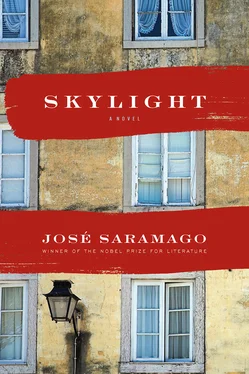“Things are so bad at the moment, though. All you hear now are complaints.”
“It’s the international situation…,” began Anselmo.
But he stopped. What was the point of getting on his soapbox and giving a speech about the international situation in the dark and with the problem of that advance still unresolved?
“I’m worried they might sack Claudinha. I know the five hundred escudos she earns isn’t much, but every little bit helps.”
“Five hundred escudos! A pittance!” muttered Anselmo.
“Maybe, but I just hope we don’t have to do without it.”
Then she fell silent, seized by an idea. She was about to tell her husband, but decided to approach the subject obliquely:
“Couldn’t you find her another job with one of your acquaintances?”
Something in his wife’s voice alerted Anselmo to the possibility of a trap.
“What do you mean?” he asked.
“What else would I mean?” she said casually. “It’s a perfectly simple question.”
Anselmo could see that it was a simple question, but he could see, too, that his wife had something else in mind. He decided not to make things too easy for her.
“And who was it who got her the job she has now? It was you, wasn’t it?”
“But couldn’t we find her something better?”
Anselmo did not reply. He would get his wife to tell him her idea by dint of force or guile. Silence was the best tactic. Rosália shifted in bed. She turned toward her husband, her slightly plump belly pressed against his hip. She tried to drive away the idea, certain that Anselmo would vehemently reject it, but the idea kept coming back, stubborn and seductive. Rosália knew she wouldn’t be able to sleep until she had told him her idea. She cleared her throat so as to make the murmur that followed more audible:
“I just thought… and I know you’ll be angry with me, but I just thought I could perhaps have a word with Dona Lídia downstairs.”
Anselmo saw immediately what his wife was leading up to, but preferred to pretend otherwise:
“Why? I don’t understand.”
As if physical contact might reduce the expected indignant reaction, Rosália moved closer. Years before, that movement would have had a very different meaning.
“I just thought… given that we get on well with her, that she might consider…”
“I still have no idea what you mean.”
Rosália was sweating now. She moved away again and, without pausing to choose her words, blurted out:
“She could ask the man who visits her. He’s a director or something of an insurance company and he might have some suitable post for Claudinha.”
Had Anselmo’s indignation been genuine, it would have burst forth at that very first sentence. Instead, he waited until she had finished, and then he reacted only very quietly, because the night obliges us to speak softly:
“I can’t believe you could suggest such a thing! You want us to go and ask a favor from that… that woman? Have you no dignity? I would never have expected you, of all people, to come up with such an idea!”
Anselmo was going too far, which would have been fine if, deep down, he did not agree with her suggestion. He didn’t seem to realize that, by speaking in those terms, he was making his eventual acquiescence even more illogical and his wife’s further promotion of the idea near impossible.
Offended, Rosália moved farther off. Between them lay a small space that could have been leagues. Anselmo saw that he had overstepped the mark. The ensuing silence made them both feel awkward. They knew the matter had to be resolved, but said nothing: she was thinking about how best to broach the subject again, and he was struggling to find a way to make surrender easier, despite what he had just said. Meanwhile, they both knew that they would not be able to sleep until some solution had been found. Anselmo made the first move:
“All right, we’ll think about it… I don’t like the idea at all, but…”
As comfortably installed as if he were in his own house, Paulino Morais crossed his legs and lit a cigarillo. When Lídia moved the ashtray closer to him, he smiled his thanks and leaned back again in the maroon armchair, which was “his” armchair on the nights when he visited. He sat there in his shirtsleeves. He was plump and red-faced. His small eyes bulged slightly as if under pressure from his fleshy eyelids. His thick, straight eyebrows met over his nose, whose sharpness was softened by a layer of fat. He had large, prominent, bristle-filled ears. He allowed the hair on the side of his head to grow long enough to be combed carefully over his otherwise bald pate. He had the prosperous air of a fifty-year-old in possession of old money and a young wife. Through the cloud of perfumed smoke surrounding him, his whole face oozed smug contentment; he wore the look of someone who has eaten well and is quietly, easily digesting his food.
He had just recounted a particularly amusing anecdote and was enjoying Lídia’s laughter, and not just her laughter. He was in an excellent mood, and this led him mentally to congratulate himself on the idea he’d had, sometime before, about what clothes Lídia should wear when he visited her. Feeling slightly spent and worn down by excess and age, he had decided that he needed some new stimuli and that what his mistress wore could be one such stimulus. No male fantasies, nothing pornographic, as he had known some of his friends to indulge in, just something simple and natural. Lídia was to receive him wearing a low-cut negligee, with her arms bare and her hair loose. The negligee had to be made of silk, not so transparent as to reveal everything, but transparent enough not to hide everything either. The result was a kind of chiaroscuro effect that inflamed his brain on those nights when he was in the mood or merely pleased his eye when he was tired.
Lídia resisted at first, then decided it was best to submit. All men have their eccentricities, and this was certainly not the worst she had known. So she gave in, especially when he bought her an electric heater. In a warm room, she was less likely to catch cold in those skimpy outfits.
She was sitting on a low stool, leaning toward her lover, showing him her braless breasts, which was how he liked them. She knew that the only thing that bound him to her was her body, and so she took every opportunity to show it off, especially now, when her body was still young and shapely. After all, there wasn’t much difference between exhibiting it here or on the beach, apart from the arousing nature of the clothes she was wearing and her provocative position.
When the evening went no further than having to exhibit herself in that flimsy attire, she thought the sacrifice well worth the bother and Paulino Morais’s tastes perfectly reasonable. And if things did go further, as she always hoped they would not, she simply resigned herself to it.
She had been living at his expense for three years now. She knew all his tics and idiosyncrasies and gestures. The gesture she feared most was when he, still seated, unbuttoned both his braces at the same time. Lídia knew what this meant. She was quite relaxed at the moment, though: Paulino Morais was smoking, and for as long as his cigarillo lasted, his braces would remain safely buttoned.
In a graceful gesture that emphasized the beauty of her neck and shoulders, Lídia turned to look at the small faience clock. Then she got up, saying:
“It’s time for your coffee.”
Paulino Morais nodded. On the marble-topped dressing table, the coffeepot stood ready and waiting. Lídia lit the little burner and placed it underneath the pot, then prepared the cup and the sugar bowl. While she was walking to and fro in the room, Paulino Morais followed her with his eyes, ogling her long legs, which were visible beneath the light fabric that clung voluptuously to her hips. He mentally yawned and stretched. He had nearly finished his cigarillo.
Читать дальше












